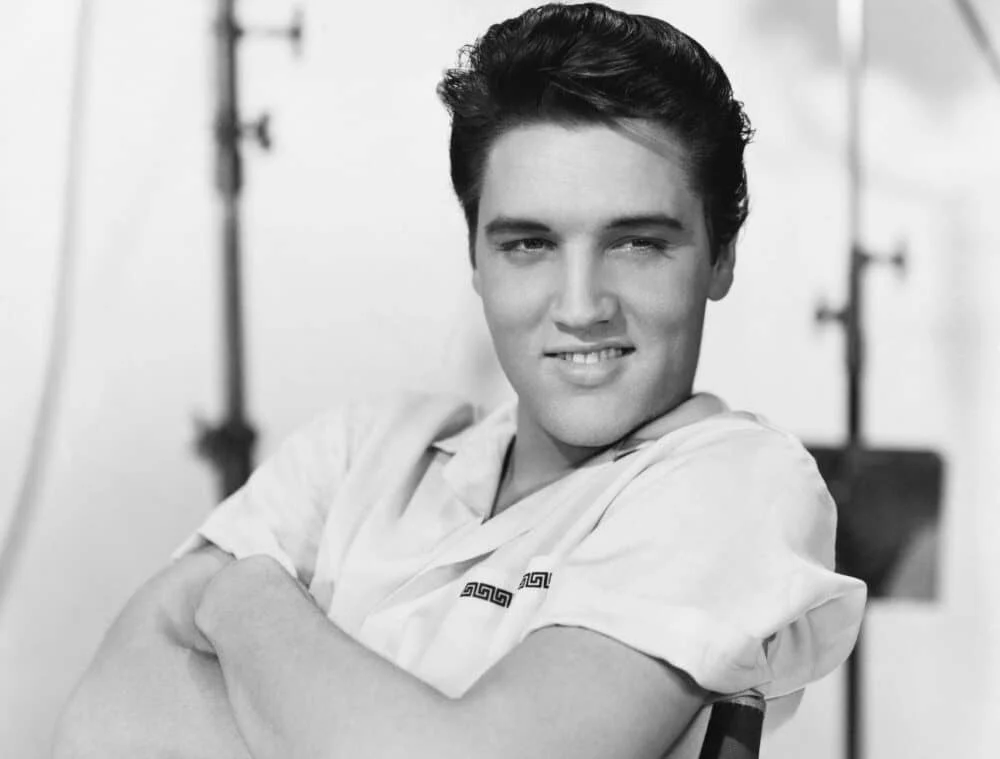In 1954, a fresh-faced 19-year-old Elvis Presley began to make waves with his appearances on the “Louisiana Hayride” radio program. Absent were the iconic gyrations and sneers that he would later become famous for—these were the early days of a legend in the making.
It wasn’t long before Presley’s presence on stage sparked an ardent following. The “Louisiana Hayride,” broadcast across 28 states, became a platform where Elvis’s career soared. His initial contract, which modestly paid him the equivalent of $18 per show, a sum comparable to around $156 today, marked the humble beginnings of a music titan.
By December 1956, Elvis was no longer just a radio show regular; he was a burgeoning icon. His first movie, “Love Me Tender,” had hit the screens the previous month, and his televised performances were smashing records. A notable appearance on the “Ed Sullivan Show” drew an astonishing 60 million viewers, securing 82.6% of the audience share. Offstage, Elvis’s merchandise empire had grossed an impressive $22 million—excluding record sales.

The Shreveport fairgrounds witnessed history during Elvis’s final “Hayride” performance to a sold-out crowd of 10,000 fans. Their cheers nearly drowned out the performance, a testament to his skyrocketing fame. However, the scheduling for the night didn’t anticipate the mass exodus following his act, as many had come solely for a glimpse of the King.
In a bid to retain the audience, Horace Logan, the announcer, assured the crowd that Elvis had exited the building, inadvertently birthing a phrase that would transcend its original intent. While Al Dvorin is often miscredited with coining it, he indeed popularized “Elvis has left the building” during his tenure as an announcer for Elvis’s concerts from 1957 onward.
Dvorin’s usage was a cue for the audience to depart, signaling no further encores. The phrase reached peak popularity with the release of “Elvis as Recorded at Madison Square Garden” in 1972. The album featured Dvorin’s voice uttering the now-iconic phrase, allowing those who had never attended an Elvis concert to experience a piece of the magic.
Elvis’s legacy endures, woven into the fabric of music history. The boy who started with a modest pay on the “Louisiana Hayride” became the King of Rock and Roll, leaving a mark that time cannot erase.
The Evolution of Elvis’s Stage Announcements
Elvis Presley’s concerts weren’t just about the music; they were a spectacle of engagement and anticipation. The phrase “Elvis has left the building,” first spoken by Horace Logan and immortalized by Al Dvorin, serves as a cultural touchstone signifying the end of an enthralling experience. But beyond this famous line, the announcements at Elvis’s performances evolved into a ritual, signaling fans with various cues that symbolized the finale of the star’s presence. The announcements themselves became as iconic as the performances, marking the bittersweet moments when the realization set in that the show was truly over.
Elvis’s Graceland was not just a home; it was an extension of his personality, a sanctuary designed with intention and care. The one-way mirrors installed at Graceland offered more than privacy; they were a metaphor for Elvis’s life—transparent to his audience to a degree, yet reflective and protective of his world. Graceland’s design elements, from the mirrored staircases to the Jungle Room’s natural decor, offer insights into the complexity of Presley’s character—a man who valued seclusion amidst fame, and introspection in the face of public scrutiny.
The Cultural Impact of Elvis’s Quotations
Elvis Presley’s influence wasn’t confined to his music; his spoken words also carried weight, often reflective of his upbringing and personal philosophy. The King’s famous line, “Don’t criticize what you don’t understand, son. You never walked in that man’s shoes,” speaks volumes about his empathy and outlook on life. This and other Elvis quotes have woven their way into the fabric of public consciousness, becoming mantras for personal reflection and human understanding. Exploring the origins and the impact of his most famous quotes reveals the depth of Elvis’s character and the enduring wisdom he shared with the world.
What You Didn’t Know About Elvis?
- Elvis Presley’s departure from the stage has transcended into a cultural metaphor for definitive endings. “Elvis has left the building” encapsulates a moment of transition, signaling the end of an era or a significant event. This phrase has been adopted across various platforms and scenarios, often used to denote the conclusion of political careers, the discontinuation of products, or even the end of personal relationships. The ubiquity of the statement in contemporary vernacular invites debate on how the finality of an icon’s exit can imprint itself onto the collective consciousness, influencing language and symbolism in popular culture.
- The monetization of catchphrases such as “Elvis has left the building” raises questions about the commercialization of celebrity statements. Merchandise emblazoned with these words, from t-shirts to mugs, points to a broader conversation about the ethics of profiting from the phrases that are inherently linked to a person’s identity and legacy. The discussion extends to intellectual property rights and the balancing act between honoring a legend’s memory and exploiting it for commercial gain.
- The reaction of audiences to the announcement of Elvis’s departure also opens a dialogue on fan behavior and expectations in live performance settings. The phenomenon of concertgoers leaving once the main act is finished, regardless of who follows, speaks to the hierarchy of performances and the psychology of audience engagement. It invites a closer look at how headliners influence concert dynamics and the responsibility of event organizers in scheduling performances to maintain audience interest from start to finish.
- Horace Logan’s statement regarding Elvis’s departure has also spotlighted the role of announcers and emcees in shaping the legacies of performers. These figures often serve as the bridge between the artist and the audience, their words capable of framing memorable moments and even crafting catchphrases that endure. There is room for debate on how the spontaneity and authority of an announcer’s on-the-spot decisions contribute to the lasting public image of entertainment icons.
- The sociological impact of Elvis’s staged farewells presents a topic for debate on how a star’s conclusion of a performance affects fandom. The sense of community and shared experience among fans during the pronounced end of a show can evoke a collective emotional response that strengthens fan identity. It prompts an investigation into how such moments of closure can solidify fan loyalty and create a shared sense of nostalgia that persists long after the event has concluded.
Tips On How To Use The Phrase “Elvis Has Left The Building”
Make Your Exit Known
When it’s time to leave a party and you want to do it with a bit of flair, channel your inner rock star. Just like the King, you can make your departure memorable without causing a scene. Drop a casual “Looks like Elvis has left the building” as you wave goodbye. It’s your cue to exit with style, and who knows, it might just catch on among your friends!
Signal the End of Your Presentation
You’ve delivered a killer presentation and it’s time to wrap things up. Instead of the usual “That’s all, folks,” why not borrow from the King of Rock ‘n’ Roll? Let your audience know you’re concluding with a playful, “And with that, Elvis has left the building.” It’s a lighthearted way to signal you’re done and ready for questions or a well-deserved coffee break.
Announce the Conclusion of a Sale
If you’re in the business of sales and your hot-ticket item is finally sold out, let your customers know with a twist on a classic line. Post on your social media or announce through your PA system, “Ladies and gentlemen, Elvis has left the building!” It’s a fun way to inform customers that it’s time to look forward to your next big offer.
Bring Closure to Your Events
As an event organizer, when it’s time to usher guests out at the end of a night, you might want to add a touch of humor. Let them know in no uncertain terms that the night is over by saying, “Thank you, everyone, Elvis has left the building!” It’s a polite and humorous nod to a well-known cultural reference that encourages people to head home.
Lighten Up Daily Announcements
Whether you’re a school principal or managing an office, daily announcements can be dry. Spice them up by throwing in an “Elvis has left the building” when an event or deadline has passed. “Attention students, the deadline for yearbook photos has officially left the building!” It’s a fun way to keep everyone informed and crack a smile or two along the way.
https://www.citationalacon.com/personne/americain-musiciens/







